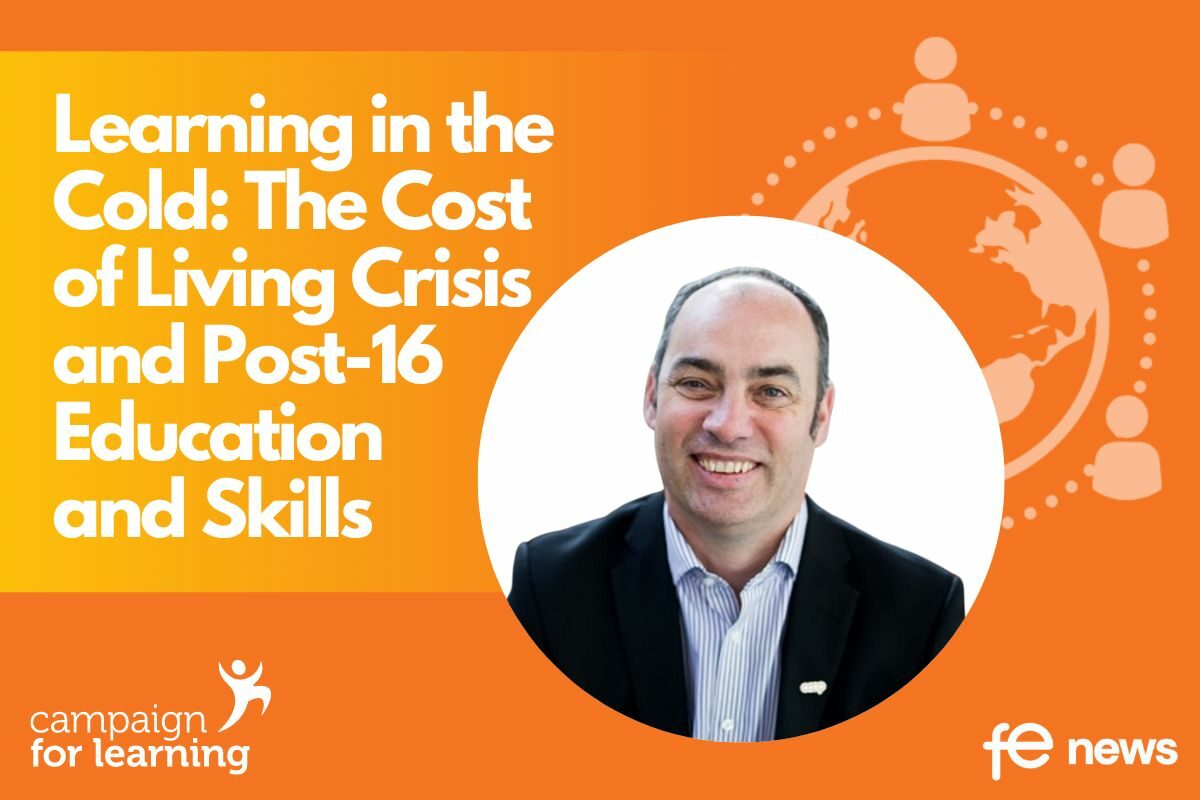The Cost-of-Living Crisis and Adult Community Learning

Educational inequality already has strong correlations with economic disparity. Those with low or no qualifications are more likely to be in the most disadvantaged communities. The cost-of-living crisis will place still more people in vulnerable categories.
Adult Learning in Strained Times
The support which adult learning offers should come to the fore in strained economic times. It is not a panacea – but as a means of regaining some control and direction over one’s life, it is hugely empowering. If placed in a community context then even more, so as it will increase social connections, reduce isolation and open up new channels of advice and support.
Progression into Employment
The absolute top-line priority of the Government’s current skills policy reforms is progression into work. As the cost-of-living crisis begins to bite, having steady employment becomes more important than ever. A skills system which is work-focused ought to be the right approach in such circumstances, but the full picture is more complicated than that. Adults with a clear path into a job and who have the confidence to take on the required courses and qualifications may thrive in the new system.
The recent fully-funded first Level 3 offer – for those who have the facility to take it up – is a very welcome improvement. The type and level of courses favoured by that reform, however, will not help everyone – and very likely will not help those who need higher levels of support to return to learning. And for those with no or low qualifications, the route to Level 3 is daunting.
Paying the Gas Comes Before Enrolling on a Free Courses
In normal times, adults face significant barriers to participating in learning even where the cost of courses are free; lack of information and guidance, lack of time, childcare and travel costs prohibit participation.
Today’s cost-of-living crisis means adults who want to learn and need to learn will be worried about how they can get enough money to pay the gas bill this winter, rather than enrolling on a free course.
Demand for courses where there are no up-front fees but are funded through fee-loans might also fall, such as adult learner loans at Level 3 and the new Lifelong Loan Entitlement at Level 4-6.
Socio-economic factors have long been identified as barriers to participation. The cost- of-living crisis may exacerbate this and may well affect adult learners in all circumstances – even some better off learners may choose not to sign on a fee-paying course if the prospect of a four-figure energy bill is imminent.
While there is financial support available for learners on low incomes and those taking entry-level or non-qualification courses, this is not well promoted or known about. Even assuming a potential learner can overcome other barriers, the fact remains that if they do not know about what is available – in terms of courses or support – they cannot participate.
Earning Before Learning and the Cost-of-Living Crisis
Those in work, especially where this is insecure, may need to supplement income with second or third jobs or over-time if available – all of which reduces the time to study outside work – while those on low incomes are less likely to have employers who invest in workforce training and development.
There is a vicious circle as the cost-of-living crisis affects not only personal finances, but also public spending – publicity budgets for charity and public sector services will be heavily constrained.
Beyond Skills for Employment
Indeed, one of the probable implications of the fall-out from the mini-budget will be cuts in departmental spending. Reducing spending on adult learning and skills would be a false economy but one assumes no budget line is entirely safe.
If adult learning which supports direct progression into work is being prioritised, then this leaves out many of those who are out of the workforce and not seeking to enter. Employment courses do not help those adults who are outside the workforce through illness or disability, because they are full-time carers, or because they have retired. The cost-of-living crisis will have severe impacts on all of these groups too and yet, they may be excluded from learning opportunities which could improve their wellbeing and life skills.
Helping Disadvantaged Groups Cope with the Costs-of-Living Crisis
Support with practical day to day things such as personal budgeting, healthy cooking and eating and everyday skills including literacy, numeracy and digital skills, can all contribute to coping better in difficult times.
Moreover, as other forms of social connection and personal fulfilment are constrained by severe lack of disposable income, adult learning provides a means of keeping active and making friends and overcoming social isolation. This aspect is also crucially important in terms of mental health and well-being.
Community Learning, in its widest sense, offers a high quality, inclusive and value for money service for adults who are seeking to make sense of an increasingly challenging world.
Finding work at a time when the economy is shrinking is hard, and so employment courses will be a lifeline for many. The bigger challenge, however, will be in how best to offer hope to those who see their opportunities shrinking because of the economic climate and need to find their way through.
Recommendation 1
DfE should publish a government-wide national lifelong learning strategy. Without one, there is the danger that short-term solutions will be sought for deep-seated problems, made worse by the need to act quickly in unprecedented economic circumstances.
Recommendation 2
DfE should fund a national campaign to promote adult education courses of all types (not just for work), especially aimed at those individuals and groups who have been hardest hit by the cost-of-living crisis.
Recommendation 3
The Treasury should maintain (at least) current levels of spending on adult education in England by DfE and recognise that the return on investment (in terms of productivity and associated costs from improvements in wellbeing) outweigh any supposed efficiency savings.
By Simon Parkinson, Chief Executive, WEA
This article is part of Campaign for Learning’s series: Learning in the cold: The Cost-of-Living Crisis and Post-16 Education and Skills
Order of series
Day 1
Friday 21st October
- Louise Murphy, Economist, Resolution Foundation: The Cost-of-Living and the Energy Crisis for Households
- James Kewin, Deputy Chief Executive, Sixth Form Colleges Association: The Cost-of-Living Crisis and 16-19 Year-Olds in Full-Time Further Education
Day 2
Saturday 22nd October
- Becci Newton, Public Policy Research Director, Institute for Employment Studies: The Cost-of-Living Crisis and 16-18 Year-Olds in Jobs with Apprenticeships
- Zach Wilson, Senior Analysis Officer and Andrea Barry, Analysis Manager, Youth Futures Foundation: The Cost-of-Living Crisis and 16-24 Year-Olds ‘Not in Full-Time Education’
Day 3
Monday 24th October
- Nick Hillman, Director, Higher Education Policy Institute: The Cost-of-Living Crisis and Full-Time and Postgraduate Higher Education
- Liz Marr, Pro-Vice Chancellor – Students, The Open University: The Cost-of-Living Crisis and Part-Time Higher Education in England
Day 4
Tuesday 25th October
- Steve Hewitt, Further Education Consultant: The Cost-of-Living Crisis: Access to HE and Foundation Year Programmes
- Sophia Warren, Senior Policy Analyst, Policy in Practice: The Cost-of-Living Crisis, Universal Credit, Jobs and Skills Training
Day 5
Wednesday 26th October
- Paul Bivand, Independent Labour Market Analyst: Economic Inactivity by the Over 50s, the Cost-of-Living Crisis and Adult Training
- Aidan Relf, Skills Consultant: The Cost-of-Living Crisis and Employer Demand for Level 2-7 Apprenticeships
Day 6
Thursday 27th October
- Mandy Crawford-Lee, Chief Executive, UVAC: The Cost-of-Living Crisis and Employer Demand for Level 4+ Apprenticeships and Part-Time Technical Education
- Simon Parkinson, Chief Executive, WEA: The Cost-of-Living Crisis and Adult Community Learning
Day 7
Friday 28th October
- David Hughes, Chief Executive, AoC: The Cost-of-Living Crisis and FE Colleges
- Jane Hickie, Chief Executive, AELP: The Cost-of-Living Crisis and Independent Training Providers
Day 8
Saturday 29th October
- Susan Pember, Policy Director, HOLEX: The Cost-of-Living Crisis and Adult Education Providers
- Martin Jones, Vice-Chancellor and David Etherington, Professor of Local and Regional Economic Development, Staffordshire University: The Cost-of-Living Crisis – The Response of Staffordshire University
- Chris Hale, Policy Director, Universities UK: The Cost-of-Living Crisis and Universities











Responses